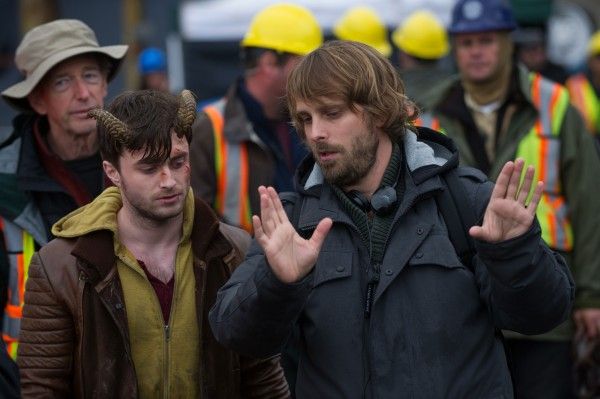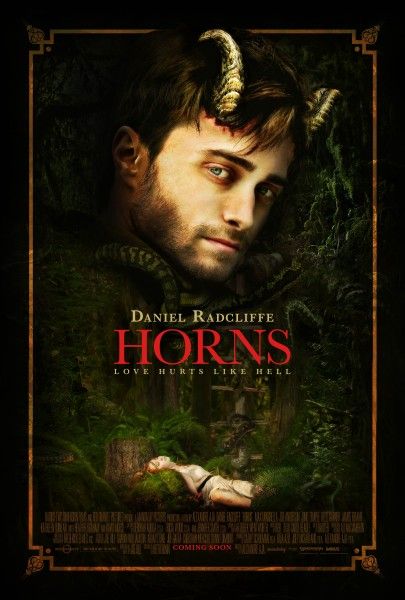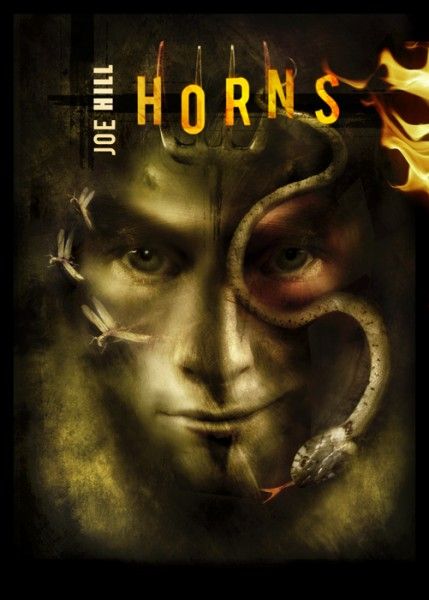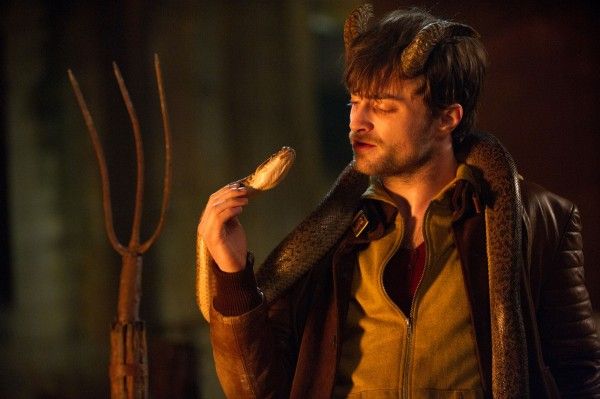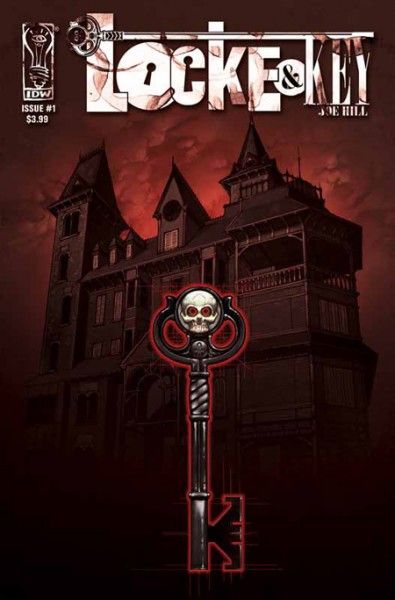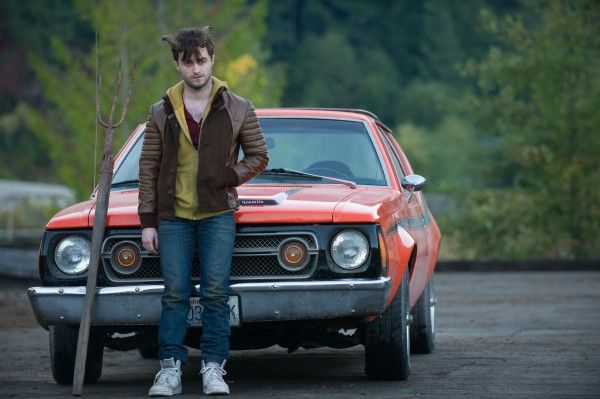From director Alexandre Aja and author Joe Hill, Horns is a unique and unusual blend of fantasy, horror, drama and comedy. Blamed for the murder of his girlfriend (Juno Temple) and ostracized by everyone he knows, a small-town guy named Ig (Daniel Radcliffe) awakens one morning to find that he’s grown a pair of horns from his temples. Armed with the supernatural powers that they possess, he sets out to find the true killer and prove his innocence.
During this exclusive phone interview with Collider, novelist Joe Hill talked about the road Horns took from the page to the screen, the story’s blend of tones, his reaction the first time he saw the film put together, and how reminiscent the adolescent years of the characters are of Stand by Me and The Body. He also talked about why Locke & Key didn’t work out for TV and the hopes for it still becoming a movie, that NOS4A2 could make an interesting cable series, that he would love to have a Lego Keyhouse and Rolls Royce Wraith, and that he just finished the first draft of his next novel, The Fireman. Check out what he had to say after the jump.
Collider: When you write something like this, that’s a bit strange and odd and doesn’t fit into any one particular category, did you ever think about who it would appeal to, or did you just write a story that you would want to read, and then left it up to the cosmos and the marketing department to figure out how to describe it to potential readers?
JOE HILL: Yeah. It’s a little glib to say marketing is someone else’s job. Actually, marketing probably is partly my job. That term “the elevator pitch” is greatly mocked, and yet, at the same time, you probably should be able to describe your story in an appealing way without talking someone’s ear off. That’s what the business is. It’s about packaging ideas in that candy-coated shell and finding a way to make it tasty to people and to make it stick. I always feel like there is a faint whiff of soap opera when I say this, but I wasn’t in a real great place mentally when I wrote Horns. I don’t think I was thinking too much about what the eventual audience would be. I sometimes say that the book is an unhappy paranoid novel that was written by a really unhappy and paranoid man. I’m very proud of it and I think it’s a lot of fun, but in some ways, it’s actually easier for me to enjoy the film.
How long of a road did this novel take to the big screen? Were there other attempts prior to this one?
HILL: Cathy Schulman at Mandalay optioned it before the book was out, or around the time the book came out, and she was always very committed to getting the film made. It stayed with Cathy, and it’s still her film. Cathy shepherded it through the hiring of Alexandre Aja and the hiring of Daniel Radcliffe, and other people stepped in and helped. Adam Stone at Mandalay, and Joey McFarland and Riza Aziz at Red Granite, and Tom Quinn at RADiUS, all came in and contributed. In some ways, it was a very strange experience because usually there are so many setbacks getting a film made, but on this one, we really had the luck of the devil.
This story has a definite mixture of tones, with dark humor, romance and horror, that would be a pretty tricky balance to keep intact from page to screen. Do you feel like to have ended up with a filmmaker like Alexandre Aja, who really did get that aspect of it?
HILL: I do. I’ve done a hundred interviews and it’s just hitting me right now, how sad it makes me that there’s this idea that the book or movie is tricky because it has so many different emotional elements to it, like comedy, romance, tragedy and horror. When did we decide, as a entertainment-consuming culture, to settle for so much less? Dickens never sat around and thought, “I can’t have this funny scene in this book ‘cause this book is only allowed to be scary.” The idea that a movie can only contain one emotional note and a story can only strike one emotional note is about marketing and not about story. All the really good stories do a lot. They don’t just do one thing. They find a way to humanize the characters through humor, and to tell love stories. I think all of my novels have been love stories, even if they have had ghosts and devils and vampires in them. The question is really what kind of touch you have, and Alexandre Aja has a very light tough and a real lovely romantic heart. Even though the film explores some real ugliness, and there are some really ugly moments and some really upsetting confrontations, I still think you can feel the affection and the warmth for these characters from the person behind the camera. You can feel that the guy in charge of telling the story cares about these people. He doesn’t want to humiliate them. He’s not out to punish them. He’s just setting them loose and letting them speak for themselves. Even when they’re confessing horrible things, he found a way to show them in a warm light.
Were there any parts of Horns that you were worried might be unfilmable as a movie, but that you think turned out particularly well, when you saw the finished product?
HILL: I don’t know if there was anything I was specifically worried about. I felt like we were in good hands with Alex, and he had the right sensibility for the work. And then, we cast Daniel Radcliffe, and I just loved him so much in The Woman in Black. Of course, I love the Harry Potter films, but I really thought that we had a chance with Dan to do something special. And he did everything I hoped he would do, and then more. My favorite scene in the film is the scene where Ig and Merrin break up. These are two people who really, really love each other, and they begin saying the most hurtful things to each other and they’re sticking the knife in, over and over. It’s so painful to watch because you know that they love each other. I don’t know how I expected that to play, but watching it, I really loved that. It made me really happy. I don’t want to say it made me really happy because that makes me sound weird. It’s too painful a scene to be happy about. But, you know what I’m saying. I really felt that they caught something authentic and powerful.
Are you someone who pictures actors as your characters while you’re writing a story, or do you not picture actual people while you’re writing?
HILL: I try to avoid picturing actors, and I almost never say, “I think this actor would be good for this part.” In a slow-witted moment, someone asked me who I thought would be great as Judas Coyne in Heart-Shaped Box, and I said Russell Crowe. I do, but I also think there are a lot of other actors who could be great as Judas Coyne. He’s one guy who would be terrific. I don’t want to get in the way of the reader imagining who they want to have. I write the story, but then it’s the reader’s job to cast it in their head. My girlfriend and I read Moby Dick at the same time, and we were going back and forth about the casting. We were like, “If it’s going to be the 13-part HBO mini-series, who would you want in it?” She won the casting game. I think her cast was better than mine. But, it was definitely a fun side dish to the experience of reading the book.
What was your reaction the first time you saw the finished film for Horns?
HILL: When they showed me the film, I felt tremendous relief. You hope that, if they’re gonna make the film, it won’t reflect badly on the book. Of course, you hope it’s going to be wonderful, but then there’s always the possibility it will be terrible and drench the book in liquid shame. I knew 20 minutes into the film that we were going to be okay, and that Alex had really put it together. I had fun the first time I watched it. And at that point, it was still rough and there were a lot of effects that weren’t there, but you could still look past all of that and see the story, and see that the story worked.
The adolescent years in Horns feel very reminiscent of Stand by Me. Was that something you were even aware of when you wrote it, or did it take seeing the movie to realize that influence?
HILL: It took seeing the movie to realize that. It never really crossed my mind while I was writing it. I never thought, in terms of The Body or Stand by Me. I just had to write about who these people were before this horrible murder took place. We know why they all hate each other and why they’re all in a state of despair, but we had to learn about how they all loved each other. It was also a chance to write about my own childhood, knocking around in Bangor, Maine, and going out to abandoned factories with my friends to horse around and blow stuff up with firecrackers. But I didn’t realize that that material felt like The Body, until I saw it on screen. And then, I thought, “Oh, my god, this is so funny. It’s like Stand by Me, set in the ‘90s.” That was amusing. Now, there are a lot of conscious Stephen King references in NOS4A2. NOS4A2 is a novel about Stephen King novels.
I saw the TV pilot that was done for Locke & Key and absolutely loved it.
HILL: Yeah, the pilot came out great!
It’s such a great pilot and the material was handled so beautifully. How involved were you with that?
HILL: The showrunner and lead writer on that was Josh Friedman. He’s gone on to script Avatar 2 and 3, and he handled The Sarah Connor Chronicles. I love Josh. Josh is just great. He’s a great storyteller. And Mark Romanek directed the hell out of it. It had a $10 million budget. The main thing that came out of the experience of the Locke & Key TV show was that I was there for a week while they filmed, and I was there with Gabriel Rodriguez, my collaborator on the comic. He’s the artist and one of my best friends in the world, and we don’t get to hang out that much because he lives in Chile. So, we were together for a week, and the best part of the filming of Locke & Key was that, every night, Gabe and I would go back to the bar, and we’d sit around and eat peanuts and talk about Locke & Key. We figured out the last two books together, Clockworks and Alpha & Omega, while we were filming the Locke & Key pilot, just hanging out in the hotel bar after a day of shooting. It was a great experience.
Originally, it was going to be a film, and then there was the TV pilot, and now there’s talk of a film trilogy. Every time I talk to Alex Kurtzman, I keep asking about the status of bringing Locke & Key to the screen, and it seems like there’s some progress being made, but what have you heard?
HILL: I think that Alex really wants to do it. I would never bet against Alex Kurtzman’s tenacity. The last time I talked to Alex, they had a massive chunk of screenplay that they really liked, for the first movie. That doesn’t mean there’s ever going to be a movie. I don’t believe in anything, until they’re actually rolling the cameras. But, I think it would be a mistake to bet against it.
Do you think the successful adaptation of Horns might help move Locke & Key along?
HILL: No, not really. I think it’s a common perception that a successful film will make other films happen, or a failed film will mean that opportunities die off, but I don’t really think that that’s all that true. So many people contribute creatively to a project that each one develops its own DNA and becomes its own creature. Horns could be a massive smash, and Alex would still be wrestling with the creative problems of Locke & Key. And if Horns is a huge turkey, Alex will still be wrestling with the particular problems of Locke & Key. The problems of adapting that story don’t get any easier or any harder, depending on what happens with Horns.
Is there something that you’ve written that you would love to see turned into a movie or TV show, and is there something that you’ve written that you hope never gets turned into another medium?
HILL: I haven’t been around long enough to have an opinion on that. I can imagine the experiences that would lead someone to say, “I don’t want to have this story adapted. I don’t want to sell the rights to this.” I’m a comic book guy. I’m used to collaborating. I’ve always had great experiences, collaborating with Gabriel Rodriguez and the team on Locke & Key, and then C.P. Wilson and the Wraith comic. If you do something that excites another creative person and makes them want to make a play or a TV show or a film, that’s tremendously gratifying. I’ve had that experience myself, of reading something or seeing something and feeling like, “I want to do a story that connects people like that.” And to have that effect on other people, I can’t imagine getting tired of that. You hope your creativity will feed other people, in the way that other people’s creativity feeds yours. There’s a lot of stuff in NOS4A2, and there are interesting things going on with cable TV, where you can tell big stories in a long form. I’m specifically thinking about Fargo, but there’s been so much, like Orange is the New Black, Mad Men and Breaking Bad. There’s been so much great novelistic storytelling on TV, but who knows if anything like that will happen. I’m always skeptical until a whole bunch of people are committed and things are actually flying forward.
Is there one of your characters that you’d most love to have an action figure for?
HILL: That’s a good question! There has been a lot of Locke & Key stuff. There’s a card game and there are replica keys, so there are Locke & Key things to play with. I like Legos, and I have to say that I think a Lego Keyhouse would be really cool. I’d love to build a Lego Keyhouse. I know that’s not exactly answering the question, but I think a Lego Keyhouse would be really cool. I’d love to have a Lego Rolls Royce Wraith. It doesn’t have to be like the Wraith from my book. It can just be a Lego Rolls Royce Wraith, and I can pretend. I can get a little mini figure and pretend that it’s Charlie Manx. That would be okay.
HILL: I’m editing the first volume of The Best American Science Fiction & Fantasy, for Houghton Mifflin. That will be out next year. And I finished a new novel called The Fireman. I actually finished the book two weeks ago, and I’m really happy with it. It’s long. It’s about 1,000 pages in manuscript. It’s Game of Thrones size. Hopefully, I’ll trim it back a bit, but I’m pretty happy with it. I’m happier than I usually am with my first drafts. Most of my first drafts are god awful messes, and this one is in pretty good shape, so that’s nice. Those are the next two things that are coming along in the pipeline. And I’m working on a book of novellas.
You decided to enter the family business and follow in your father’s footsteps, as a writer, but you’ve also managed to achieve the nearly impossible, in establishing your own identity. Aside from publishing under a different name, do you feel like you were given space to find that identity and establish yourself on your own merits?
HILL: By the time I was 18, I knew I really wanted to be a novelist. I loved writing, and it was what I wanted to do with my life. And the two things that I decided in being a novelist were that I wasn’t going to be Stephen King’s son anymore and I wasn’t ever going to write horror or fantasy. I stuck with one part of that. Although I’m so proud of my dad and love my dad, and I am his son, but when I was 18, I dropped the last name and started writing as Joe Hill. I was able to keep it a secret for about a decade and make short story sales to little literary journals. Eventually, I sold my first book of stories to a small English press, and the publisher there didn’t know anything about my dad. That was important to me, first and foremost, because I was really insecure. I need to know that when I sold a story, it sold for the right reasons and not because I was a famous guy’s kid. It was also important to have the space to learn my craft and make mistakes in private, which is where they belong. And there’s really only one way to do that, and that’s to collect rejection slip after rejection slip. You have to collect hundreds of rejection slips. You have to get hurt. You have to write a couple of novels that you can’t sell to anyone.
A lot of people talk about how wonderful this new environment of self-publishing is, with direct publishing to the internet, and in some ways, I’m not sure that that is so healthy to a writer’s development. It frees you from the difficult task of ever learning the elements of the craft that you need to break through into a highly competitive atmosphere. You’re essentially refusing to complete, which sounds noble, but actually might stunt your growth. The other part of my plan, to never write fantasy, didn’t work, but the thing is that I love fantasy. I tried to write New Yorker stories, but those stories were boring to me. I wasn’t having any fun. Technically, they were pretty good, but they just didn’t live on the page. Editors would reply and say, “We really admire your craft, but this doesn’t excite us.” And I knew what they meant because those stories didn’t excite me either.
I was a kid who grew up reading Stephen King novels, and I was a kid who grew up reading Fangoria magazine, Ray Bradbury and Sherlock Holmes. I wanted to write fantasy and horror and science fiction, and thrilling tales and suspense stories. I had a moment, about four or five years into writing under the pen name, when I suddenly realized that I didn’t have to be afraid. If I wanted to write fantasy, I could because I wasn’t Joseph King anymore, I was Joe Hill, and no one would know. So, I started writing fantasy stories and I started writing ghost stories, and it was tremendously freeing. And almost as soon as I made that decision, stories started to come and I started to make sales.
Well, I hope that I’ll get to talk to you again, once a Locke & Key movie has actually happened.
HILL: I hope so, too! To get the rights over to Universal, Universal had to cut a deal with Fox because of the pilot. I think it would be cool, if they made the Locke & Key film and it was a big hit, and then when it came out on Blu-ray, they had the unaired pilot as part of it. That would be awesome! I sometimes feel like that TV show is in its third hit season, in my imagination. In some ways, the really frustrating part is the sense that Fox passed on it because it was too scary, and yet meanwhile, at the exact same time, their sister channel FX was preparing to release American Horror Story, which is now a huge thing for them. It’s nothing against American Horror Story, but I do wish ours had been on. We came close. We had a pilot that people liked, and the success of American Horror Story suggests that maybe Locke & Key also could have been successful. But, it’s very tough to get a TV show on.
Horns is now playing in theaters and on VOD.

